Trust in the Workplace:
How Managers Boost Engagement and Retain Top Talent
Mira was drowning in a sea of blood and sweat.
It was her 9th month as a manager, and she still hadn’t found common ground with her team.
Their relationship felt like a roller coaster.
On some days, their morale and productivity levels were at an all-time high. But on most days, they barely struggled to meet targets.
Deep down, she could tell there was lack of trust with her team. Perhaps, some underlying issue causing them to lose motivation.
She tried everything in the manager's playbook to get them to share their thoughts and concerns. But her efforts were met with more frustration.
Frustrated, she assigned more projects to the top-performing employees. The work needed to be done. So, why not give it to those who could handle it, she thought.
This decision cost her company more than money.
Top talent jumped ship. Some took more sick days than usual, as per the doctor's orders.
Levels of trust hit all-time low. And the weight of everything left Mira feeling like a total failure…
Does this story resonate with you?
Perhaps, you’ve been down this road a couple of times. Or you’re here right now. Or you’re new on the playing field, trying to learn the ropes.
Whichever stage of the journey you are in, we can all agree that:
All managers desire to lead a happy, productive team. Or, at least, a team committed to company culture (and goals).
The truth is that building such a team comes at a price.
And that price is trust.
Trust, as Brain Tracy defines it, is the glue that holds all relationships together. Here's how he put it:
The glue that holds all relationships together, including the relationship between the leader and the led, is trust, and trust is based on integrity.
In other words, without trust, there'll be no relationship. And without a relationship, you can kiss your dream of leading a stronger team goodbye.
So, how can you build a culture of trust in the workplace?
By finding out if your team trusts you.
Of course, you can't just walk up to them (or schedule a 1-on-1) and be like, "Hey, do you trust me?"
Unless you love half-truths.
A more reliable way to measure your team's trust level is to ask the right questions. Not verbally but with the right tool.
That’s where a team connection and employee engagement software comes in handy.
A tool that lets you know your team's thoughts in seconds. I bet if Mira had such a tool at her disposal, she'd have known where to focus her efforts and make changes that move the needle.
But you're no Mira.
You have a chance to turn things around for your team.
(By the way, Mira isn't a real person. But her problems are real, everyday challenges managers face).
You can improve the level of trust in your workplace, boost employee engagement, performance, and retain top talent.
I'll be showing you how to do that through this guide.
Table of Contents:
Does your team trust you?
Find out what they think, focus your efforts, and boost engagement with ShowUp.io
Let’s start with...
Why You Should Care About Building Trust in the Workplace Right Now
Leading a team of disengaged, unreliable employees can be frustrating.
It's even worse when you don't know what they are thinking about you and the company. Or what concerns and challenges they might have.
Annoying, right?
But you know what's more annoying?
Managing such a team remotely (or a hybrid team with these qualities).
With the new way of work, you need a fool-proof strategy for managing your team effectively. Especially since you don't get to see all or some of your team.
But even with such constraints, you can build a team whose productivity isn’t forced. Instead, it is fueled by trust.
When your team’s actions are fueled by trust, they are aligned.
In other words, they don’t need to be told where to go or what to do.
They have a clear understanding of the company’s direction. They know how their day-to-day tasks help to achieve set goals. And they collaborate to achieve those goals.
They also value transparency.
They give honest, direct feedback, knowing you’ll take action.
And when you listen for their feedback, you learn about their thoughts about you (and the company).
Ultimately, you end up with actionable insights to make changes that drive team and business growth.
But don't take my word for it alone.
A US Study revealed what happens in high-trust companies:
- 74% less stress
- 50% higher productivity
- 106% more energy at work
- 13% fewer sick days
- 76% more engagement
- 29% more satisfaction in their lives
- 40% less burnout
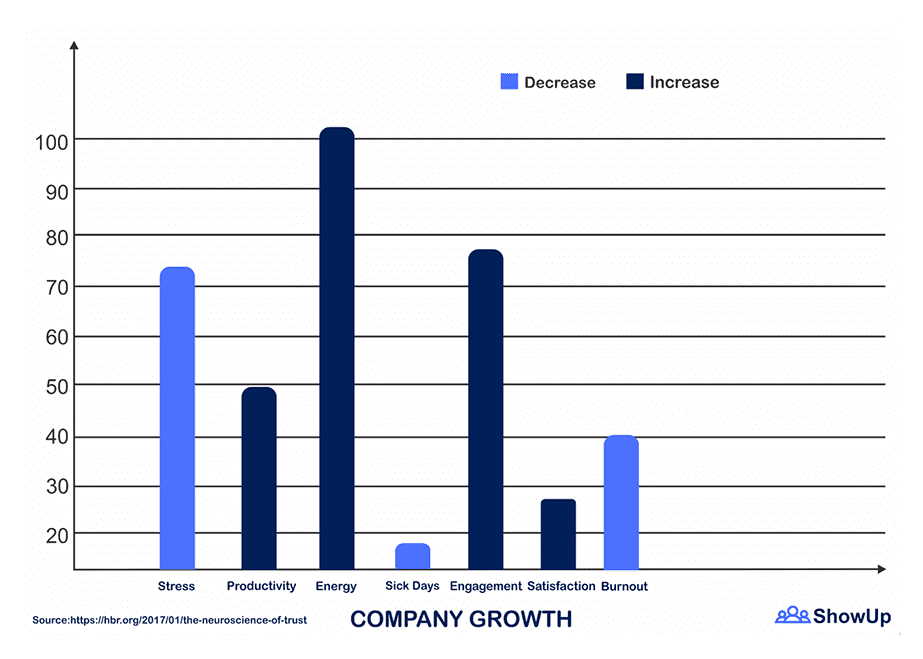
Imagine seeing such massive changes in your team.
The results?
A continuous increase in engagement, productivity, retention, and of course, profits.
The sweet part?
Customers are attracted to brands that value trust and transparency.
It's why Roger Staubach, former NFL quarterback, said:
If you don't have trust inside your company, then you can't transfer it to your customers.
What better way to boost sales and profits than through your company’s first brand ambassadors - her employees?
The people, after all, are the assets that convert your big ideas into money.
At least now you know why you should care about building a culture of trust. Now, let's explore the how.
How do you build workplace trust?
First, we measure. Then we strategize based on the results and take action.
This is where ShowUp, a team pulse survey tool, comes to the rescue.
Does Your Team Trust You? How to Find Out Using Team Pulse Surveys
When there's a disconnect between your words and actions, employees start to lose motivation.
Ultimately, they become stressed, and it reflects in their output.
Now is a great time to do some "soul-searching.”
Does your team trust you? Are you intentionally building trust with members of your team?
There are two ways to find the answers to these questions.
The first is by reflecting on your actions and how your team responds to you as a manager. The second is by tracking your team's pulse regularly.
Let's start with the second.
When you track your team's pulse regularly, you can easily tell when trust is lacking. Or when it is falling. Nothing takes you unawares.
A team pulse survey software is a fast and straightforward way to do this.
The survey questions sent out weekly (or bi-weekly) let you evaluate employee trust levels. Their responses give you real insights to inform your strategy.
You can instantly uncover trust gaps on your team. And focus your efforts on areas that need the most attention.
ShowUp is a team pulse software that simplifies the whole process.
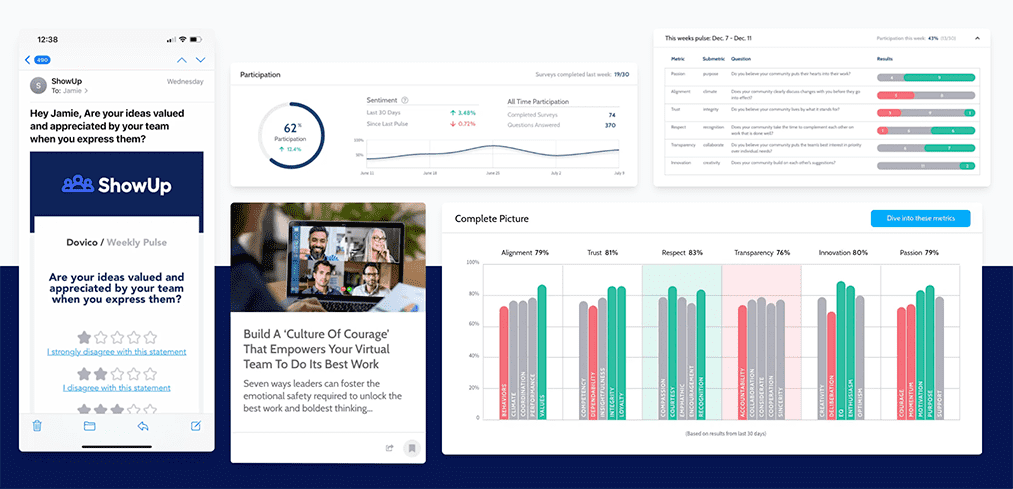
It measures trust using these five traits:
- Competency
- Dependability
- Insightfulness
- Integrity
- Loyalty
These traits reveal how much trust your team has.
So, how do you measure trust with ShowUp?
The process is pretty straightforward.
Every week (or biweekly), your team gets six science-based survey questions (one of which measures the trust metric).
It's delivered right to their inbox. So, your team will get an email that looks like this:
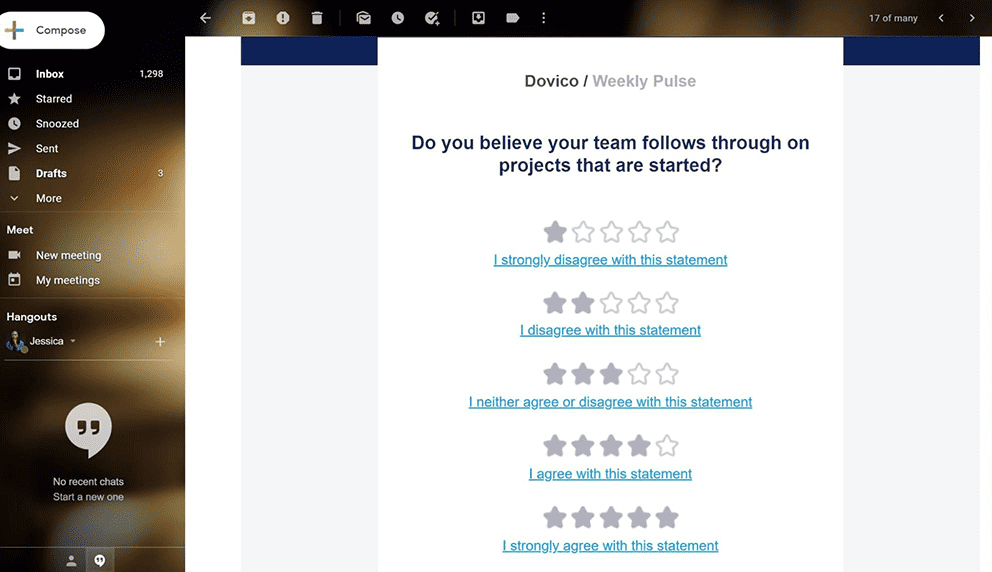
An employee can participate by clicking on one of the survey options.
To participate in the survey, all an employee needs to do is click on one of the five options provided in the email.
For example, “I strongly disagree with this statement.”
And once they do, ShowUp smoothly transitions them to complete the survey:
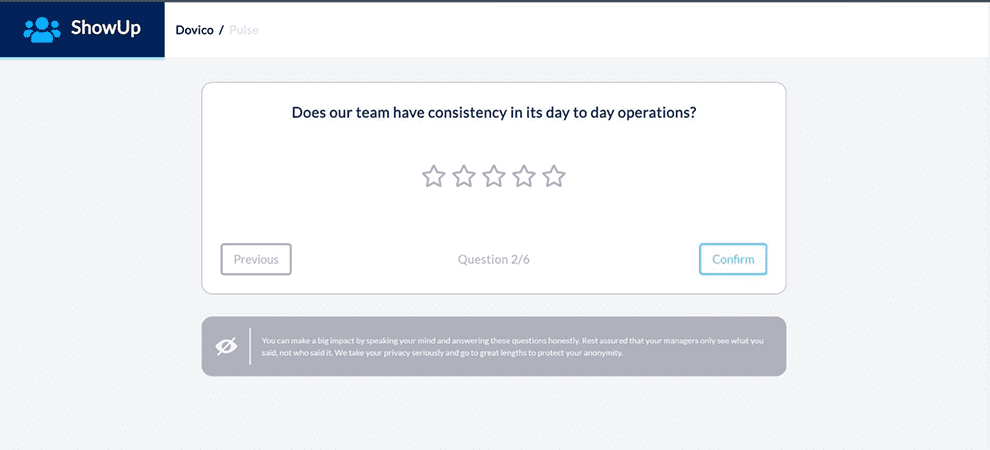
The survey, of course, is anonymous.
Offering employees anonymity helps them openly answer questions sincerely. So, you can get more accurate results.
And your focus will be on the areas that need improvement, not on who said what.
ShowUp collates the responses, giving you a clear, detailed report for each category.
Right there on the dashboard, you’ll be able to see your strengths (the areas where your team is aligned).
And your growth opportunities (areas that need your attention). Specifically, the questions that had the lowest score.
It looks just like this:
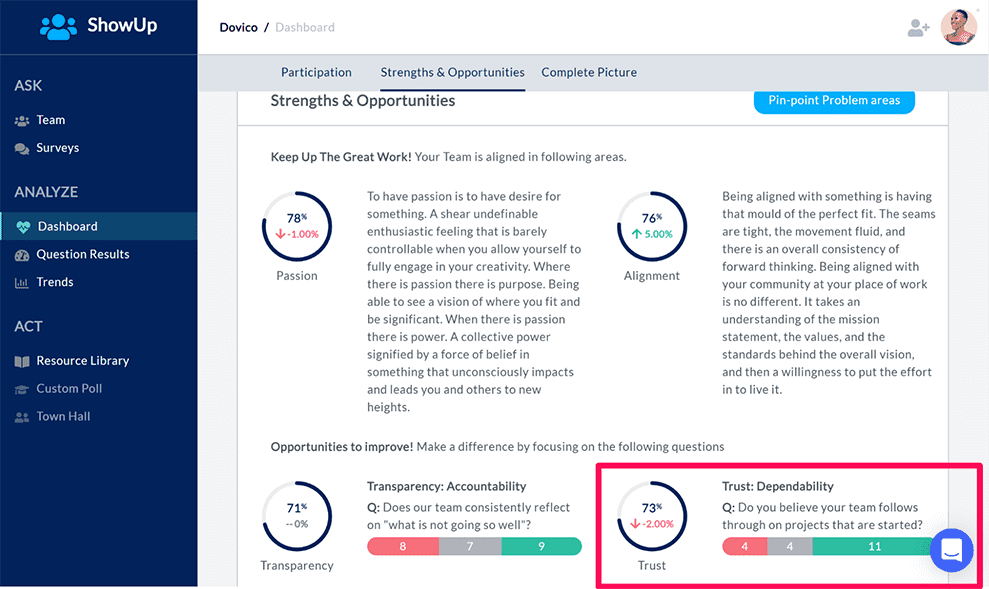
If this were your team, you’d see that there’s a dependability issue.
Anything below 80% (which is the average) is a symptom you shouldn't ignore.
Ordinarily, this might go unnoticed, and it could grow into something worse.
But with this insight, you know where to put in the work to get tangible results.
It doesn’t end there.
With ShowUp, you get a backlog of actionable resources to create an action plan and solve this problem immediately:
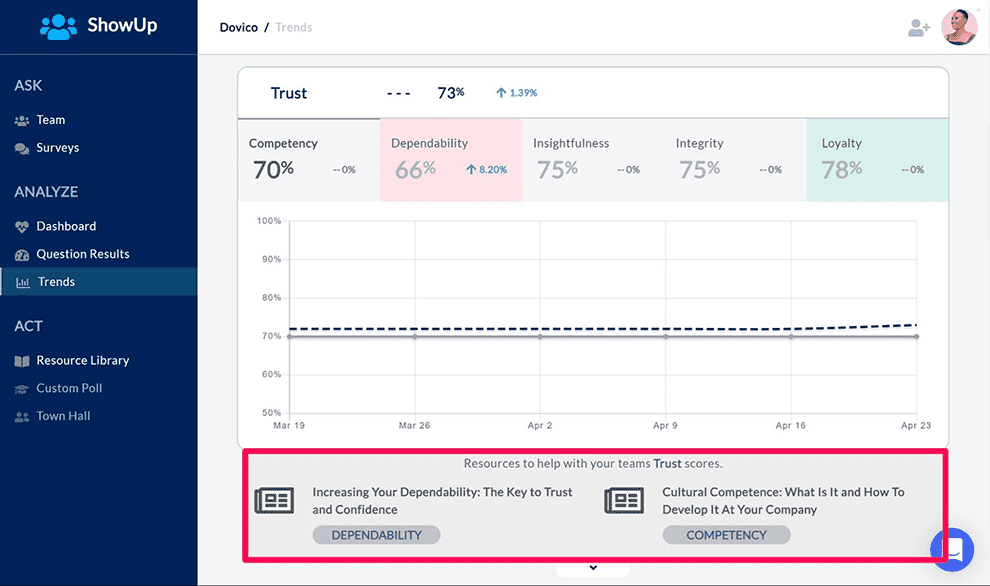
So there you have it…
A practical way to measure and improve your team's trust levels, relying on accurate data and actionable tips.
When you apply each of these steps, you're sure on your way to building a culture of trust, boosting engagement and retention rates.
Does your team trust you?
Find out what they think, focus your efforts, and boost engagement with ShowUp.io
Six ways to build trust with your team (and in the workplace)
1. Encourage Open, Transparent Communication
Open communication helps you keep up with your team and support them better. You can spot areas where your team needs support and guidance.
When you share information with your team, you let them know how much you trust them.
No wonder Santosh Kalwar said:
Trust starts with truth and ends with truth.
Bottom line?
Be sincere with employees.
Also, engage them in conversations.
When you do so, you'll be in the loop of what's going on in their lives (professionally and personally).
You can encourage transparent communication by doing the following:
- Ask for feedback from your team regularly. And be willing to listen.
- Be willing to prioritize and act on their feedback.
- Reveal your plans and reasons for doing them.
- Allow them to pitch in (make suggestions).
- Connect with your team on a personal level.
2. Break down silos.
Don't keep your team in the dark about important information, especially when it involves critical company changes.
When they have access to critical information, they'll trust you more and loosen up enough to perform their role effectively.
You can start by letting your team know about significant company changes.
You mustn’t surprise them with the information. Instead, be open about it, and be sure to share it on time.
One last thing:
Ensure your team can easily find what they need to get their job done.
3. Give Trust To Earn Trust.
Trust is a two-way street.
If you want employees to trust you, you need to let them know you trust them, not by telling, but by showing.
It's why H. L. Mencken said:
It is mutual trust, even more than mutual interest, that holds human associations together.
You can start by allowing them to take the initiative and be innovative.
When you empower employees to maximize their expertise and skills, you're letting them do what they love to do best. It's like a fish in its natural habitat.
Also, avoid micromanaging your team. If you assign them a task, check on it at intervals. You can help the process by establishing a clear set of goals and objectives as guidelines/boundaries. Then, let your team perform.
Keep in mind that it's your job to ensure they are aligned. But hovering over them won't be a good look on you. So, share the direction they need to go and let them decide how they will get there.
4. Lead By Example, Even When You Fail
When you make mistakes, don't try to keep them tucked away from the team.
Instead, see mistakes as a learning opportunity.
Owning up to mistakes reveals that you're not superhuman. You're just a human-like the other employees. So, give yourself a chance to grow.
Don't hold back from saying, "Hey… I was wrong. I'm sorry…" When you call yourself out, you're showing the team how to take responsibility for their mistakes.
You can use your mistakes as a wisdom moment. Share it with the team and let everyone contribute to the conversation.
Also, in moments of ignorance, don't be afraid to admit that you don't have all the answers. You can reach out for help when you need it. Show employees that they can come to you for help as well.
This quote from Tim Fargo puts a perfect cap on this tip:
Mistakes should be examined, learned from, and discarded; not dwelled upon and stored.
5. Listen More than You Talk
One of the secrets of excellent, effective communication is listening.
And trust happens when your team feels they can trust you with certain information. You can learn to pay attention more closely so you can hear what your team is saying.
Try to listen without prejudice or any preconceived notions.
You can also repeat a summary of what you heard (from the conversation), so they can confirm if you are in line. When you don't understand, ask for more information.
6. Let Your Team Know You Trust Them
Letting your team know you trust them can be the difference between a breakthrough and a disaster.
Communication drives trust.
So, use any opportunity you get to remind your team of their accomplishments. Or how they pulled through in dark days. Or what they did right when they fail.
One last thing:
Give your team a chance to grow.
Don't be all over them when they make a mistake. Instead, encourage them and give constructive feedback.
Conclusion: Use Pulse Surveys That Foster A Culture of Trust
When you invest in building your relationship with your team, you'll see how easier it will be for them to align, respect, trust, and be transparent.
That way, your team can project their best selves and drive company growth.
Your team can trust you more.
It will show in their actions, and you'll have a more engaged, productive team.
ShowUp gives you the power to do this.
By diving deep into your team pulse results, you get real insights to align and build a stronger team.
And you can enjoy hitting your goals and blowing the cap off your financial projections with a happy and engaged team!
